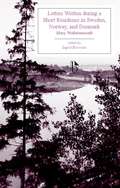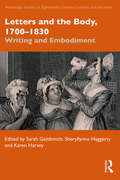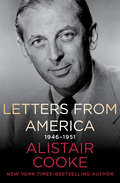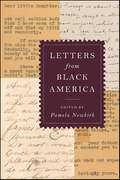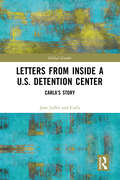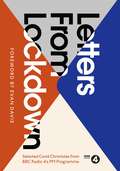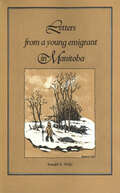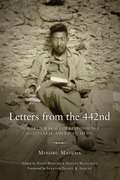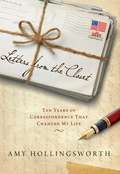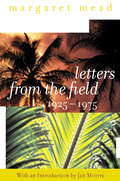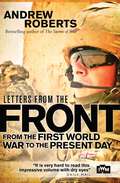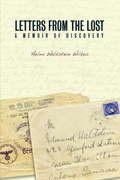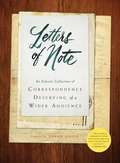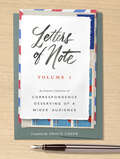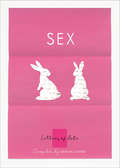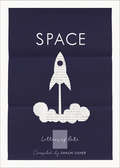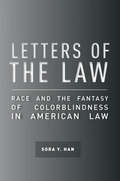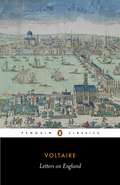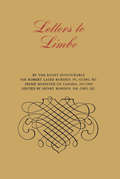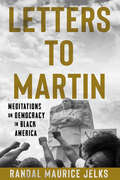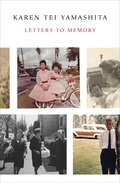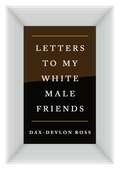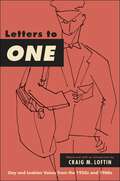- Table View
- List View
Letters Written During a Short Residence in Sweden, Norway, and Denmark
by Mary Wollstonecraft"The art of travelling is only a branch of the art of thinking," Mary Wollstonecraft wrote in one of her many reviews of works of travel writing. A Short Residenceis her own travel memoir. In a series of letters addressed to an unnamed lover, the work narrates Wollstonecraft's journey through Scandinavia in 1795, on much of which she was accompanied by her infant daughter. Passionate and personal, A Short Residenceis at once a moving epistolary travel narrative, a politically-motivated ethnographic tract, a work of scenic tourism, and a sentimental journey. It is both as much a work of political thought as Wollstonecraft's better known treatises, and a brilliant, innovative, and influential work in the genre. This Broadview edition provides a helpful introduction and extensive appendices that contextualize this remarkable text in relation to key political and aesthetic debates. It also includes a significant selection from Wollstonecraft's travel reviews.
Letters and the Body, 1700–1830: Writing and Embodiment (Routledge Studies in Eighteenth-Century Cultures and Societies)
by Karen Harvey Sarah Goldsmith Sheryllynne HaggertyThis collection explores the multifaceted relationship between letters and bodies in the long eighteenth century, featuring a broad selection of women's and men’s letters written from and to Britain, North America, Europe, India and the Caribbean, from the labouring poor to the landed elite. In eleven chapters, scholars from various disciplines draw on different methodological approaches that include close readings of single letters, social historical analyses of large corpora and a material culture approach to the object of the letter. This research includes personal letters exchanged among family and friends, formal correspondence and letters that were incorporated into published forewords and appendices, journals and memoirs. Part I explores the letter as a substitute for the absent body, the imagined physical encounters and performances envisaged by letter writers and the means through which these imagined sensations were conveyed. Part II examines the letter as a material object that served as a conduit for descriptions of the material body and as an instrument for embodied encounters. Part III focuses on how correspondents purposefully used their bodies in letters as a means to create intimacy, to generate social networks and build a ‘body politic’. This interdisciplinary volume centred around letters will be of interest to scholars and students in a variety of fields including eighteenth-century studies, cultural history and literature.
Letters from America, 1946–1951: 1946-2004
by Alistair Cooke&“[Cooke is] one of the most gifted and urbane essayists of the century, a supreme master.&” —The Spectator As the voice of the BBC&’s Letter from America for close to six decades, Alistair Cooke addressed several millions of listeners on five continents. They tuned in every Friday evening or Sunday morning to listen to his erudite and entertaining reports on life in the United States. According to Lord Hill of Luton, chairman of the BBC, Cooke had &“a virtuosity approaching genius in talking about America in human terms.&”Letters from America: 1946–1951 contains highlights from the first five years of Alistair Cooke&’s legendary BBC radio program, years when listeners were eager to put the horrors of World War II behind them. Cooke&’s lively and illuminating dispatches from New York perfectly capture the spirit of the times. From the significance of Labor Day to reflections on the changing seasons to the heroic Long Island duck that saved two people from drowning, little escapes the broadcaster&’s sharp reportorial eye and affable wit. This collection includes Cooke&’s historical tour of Washington, DC, and his thoughts on why New York is such a singular city, and covers more serious topics such as the Soviet threat and the anxieties of the atomic age. Always captivating, Cooke treats the reader to profiles of Joe Louis and Will Rogers and reflections on Damon Runyon&’s America, and concludes with a &“Letter to an Intending Immigrant.&”Letters from America: 1946–1951, the first volume of Cooke&’s iconic broadcasts, offers a captivating journey through culture, history, and politics and is a classic of twentieth-century journalism.
Letters from Black America
by Pamela NewkirkLetters from Black America fills a literary and historical void by presenting the pantheon of African American experience in the most intimate way possible—through the heartfelt correspondence of the men and women who lived through monumental changes and pivotal events, from the 1700s to the twenty-first century, from slavery to the war in Iraq. The first-ever narrative history of African Americans told through their own letters, this book includes the thoughts of politicians, writers, and entertainers, as well as those of slaves, servicemen, and domestic workers. From a slave who writes to his wife on the eve of being sold to famous documents like Martin Luther King, Jr.'s "Letter from Birmingham Jail," these writings illuminate struggles and triumphs, hardships and glory, in the unforgettable words of the participants themselves. Letters from Black America is an indispensable addition to our country's literary tradition, historical understanding, and self-knowledge.
Letters from Inside a U.S. Detention Center: Carla's Story (Global Gender)
by Carla Jane JufferAfter fleeing homophobia and threats to her life in her native El Salvador, ‘Carla’ was detained for two years inside the Buffalo Federal Detention Center. Her letters provide a powerful and unique account of a queer woman’s experience inside America’s asylum system. Letters from Inside a U.S. Detention Center reconstructs Carla’s story from the correspondence between Carla and Jane Juffer, a professor at Cornell University, and from excerpts from the legal decisions made while she was being held in immigration detention. Contextualised with explanation and analysis of detention in the United States, the book examines how detention exacerbates the trauma many migrants experience and becomes another site of fear, intimidation, and uncertainty. Carla’s narrative is a powerful story, and one that illustrates grievous injustices in the U.S. immigration and asylum system. The book will be of immense value to immigration activists and scholars alike, especially in feminist studies, queer studies, and those studying the intersections of prisons and detention centres.
Letters from Lockdown: A Selection of Covid Chronicles from BBC Radio 4’s PM Programme
by Evan DavisA remarkable collection of 'Covid Chronicles' -- stories from lockdown sent in from listeners to BBC Radio 4 -- making a deeply moving people's history of the pandemic. On 23 March 2020, as the deadly virus spread around the world, the UK went into lockdown. In the following weeks and months, it became clear that in many ways we were all in this together, but the illness and the long period of isolation would hit people in entirely different ways.When BBC Radio 4's PM Programme launched the 'Covid Chronicles' series, listeners from across the country - and beyond - began sending in their lockdown stories to be aired on the show. The results are astonishing: moving, profound, funny, powerful and an invaluable record of our collective experiences. Ranging from the everyday (the thrill of booking a food delivery) to the momentous (a wedding on Zoom), we hear about birth and death, loneliness and loss, community and kindness, as well as remarkable stories from those working in the NHS on the front line.This book is a collection of some of these Chronicles, written in the midst of one of the most unexpected and intense moments in our history. Together they give us an unforgettable portrait of ordinary people caught in extraordinary times, with all the humour and tragedy and uncertainty we've been through. 'It's inspiring that so many people have shared their stories - some everyday, some life-changing, but all very human. This is a wonderful collection of experiences, to record and remember this devastating year' Christie Watson, bestselling author of The Language of Kindness
Letters from a Young Emigrant in Manitoba
by Norman SchmidtLetters from a Young Emigrant in Manitoba first published in 1883 and long out of print, is one of the best records of Canadian immigrant life. The letters were written by Edward ffolkes, who left England in 1880 to study at the Ontario Agricultural College in Guelph and later to homestead in southern Manitoba. They describe with rare insight the daily struggles and expectations of an “ordinary” man who had the courage to take up a new life on the frontier. Ronald A. Wells has introduced the volume with a wide-ranging essay on the role of popular knowledge about Canada in Britain and the significant shift of British migration from the United States for Canada at the end of the nineteenth century. This edition has been designed in the style of the original, with the addition of Norman Schmidt’s evocative line drawings.
Letters from the 442nd: The World War II Correspondence of a Japanese American Medic (The Scott and Laurie Oki Series in Asian American Studies)
by Minoru MasudaThis is the first collection of letters by a member of the celebrated 442nd Combat Team, which served in Italy and France during World War II. Written to his wife by a medic serving with the segregated Japanese American unit, the letters describe a soldier’s daily life. Minoru Masuda was born and raised in Seattle. In 1939 he earned a master’s degree in pharmacology and married Hana Koriyama. Two years later the Japanese struck Pearl Harbor, and Min and Hana were imprisoned along with thousands of other Japanese Americans. When the Army recruited in the relocation camp, Masuda chose to serve in the 442nd. In April 1944 the unit was shipped overseas. They fought in Italy and in France, where they liberated Bruyeres and rescued a “lost battalion” that had been cut off by the Germans. After the German surrender on May 3, 1945, Masuda was among the last of the original volunteers to leave Europe; he arrived home on New Year’s Eve 1945. Masuda’s vivid and lively letters emphasize his surroundings, his daily activities, and the people he encountered. He describes Italian farmhouses, olive groves, and avenues of cypress trees; he writes of learning to play the ukulele with his “big, clumsy” fingers, and the nightly singing and bull sessions which continued throughout the war; he relates the plight of the Italians who scavenged the 44 2nd’s garbage for food, and the mischief of French children who pelted the medics with snowballs. Minoru Masuda was professor of psychiatry at the University of Washington. Hana Masuda was Minoru’s wife. Dianne Bridgman is the former manager of the Washington State Oral History Program.
Letters from the Closet: Ten Years of Correspondence That Changed My Life
by Amy HollingsworthAn honest and poignant look into the deeply intimate yet platonic relationship between a gay English teacher and his young female protégée--each seeking connection and acceptance--as reflected by the decade of letters they exchanged.It was an improbable relationship from the start--a high school English teacher, still in the closet, and his best student. From the confines--and protection--of his closet, Amy's teacher wrote these letters, letters that were read, cherished, answered, and then locked away for years. Now Amy looks back at the decade of intimate letters that preceded her teacher's untimely death, collects the shards left by their clumsy, sometimes violent attempts to unmask each other, and counts again the cost of knowing and being known. Every writer needs a room of his own, but for some people, at certain times, and in certain circumstances, the best you can do is a closet. Timely and relevant, this is a love story of the most contemporary kind, a rare glimpse into an intimate relationship between teacher and student--a relationship whose effects are still being felt decades later. It's raw and honest and moving, a poignant commentary on the values that unite us all.
Letters from the Field, 1925-1975
by Margaret MeadMargaret Mead was famous for keeping in touch with a wide circle of friends as we see in this collection of wonderfully revealing correspondence from the field. Written over a period of half a century, these letters to friends, family, and colleagues detail her first fieldwork in Samoa and go on to record her now famous anthropological endeavors in mainland New Guinea, the Admiralty Islands, and Bali. Enhanced by photographs, these intelligent, vivid, frequently funny, and often poetic letters tell us much about Mead's passion for and understanding of preliterate cultures. But they are equally valuable as a fundamental text on the science -- and art -- of anthropology. This edition, prepared for the centennial of Mead's birth, features introductions by Jan Morris and Mead's daughter. Mary Catherine Bateson.
Letters from the Front
by Andrew RobertsSimilar to Letters From Iwo Jima and All Quiet On The Western Front, this book tells the story of young men from many nations thrown into the crucible of war, fighting not just to survive, but to understand what was happening to them and their comrades. It tells it in the words of the soldiers themselves, in their letters home.A legacy of an empire and a nation at war, Love, Tommy, is a collection of letters housed at Imperial War Museums sent by British and Commonwealth troops from Canada, Australia, New Zealand and South Africa from the front line of war to their loved ones at home. Poignant expressions of love, hope and fear sit alongside amusing anecdotes, grumbles about rations and thoughtful reflections, eloquently revealing how, despite the passage of time, many experiences of the fighting man are shared in countless wars and battles. From the muddy trenches of the Somme to frozen ground of the Falklands to the heat and dust of Iraq, these letters are the ordinary soldier's testament to life on the front line.
Letters of Light: Arabic Script in Calligraphy, Print, and Digital Design
by J. R. OsbornArabic script is one of the world’s most widely used writing systems, for Arabic and non-Arabic languages alike. J. R. Osborn traces its evolution from the earliest inscriptions to digital fonts, from calligraphy to print and beyond. Students of communication, contemporary practitioners, and historians will find this narrative enlightening.
Letters of Note
by Shaun UsherThis spectacular collection of more than 125 letters offers a never-before-seen glimpse of the events and people of history--the brightest and best, the most notorious, and the endearingly everyday. Entries include a transcript of the letter; a short contextual introduction; and, in 100 cases, a captivating facsimile of the letter itself. The artfulness of Shaun Usher's eclectic arrangement creates a reading experience rich in discovery. Mordant, hilarious, poignant, enlightening--surprise rewards each turn of the page. Colorfully illustrated with photographs, portraits, and relevant artworks, Letters of Note is an instant classic.
Letters of Note: An Eclectic Collection of Correspondence Deserving of a Wider Audience
by Shaun UsherThe companion volume to the New York Times bestseller Letters of Note—includes missives from Abraham Lincoln, David Bowie, Marge Simpson, and others.Each turn of the page brings delight and discovery in this collection of 125 captivating letters that spans centuries and place, written by the famous, the not-so-famous, and the downright infamous. Entries are accompanied by a transcript of the letter, a short contextual introduction, and a spirited illustration—in most cases, a facsimile of the letter itself. As surprising as it is entertaining, Letters of Note: Volume 2 is an ebook of endless enjoyment and lasting value.“Offers newcomers and fans of the series another outstanding compendium of correspondence from celebrities, U.S. presidents, and ordinary citizens . . . This fantastic collection of over 125 letters is endlessly entertaining.” —Publishers Weekly (starred review)“Take a break from email and text messaging and dive into this impressive collection of letters instead. History lovers and bibliophiles alike will relish poring through 125 letters written by authors, scientists, celebrities, and ordinary people.” —Real Simple (Holiday Gift Guide Pick)“Wise, funny and poignant letters from around the world and throughout the ages.” —The Advocate“The books in this series . . . are some of the most approachable ways to learn about history and culture, and really pull at your emotions, lifting your spirits, making you laugh, or creating a somber tone.” —GeekDad
Letters of Note: Sex (Letters of Note #12)
by Shaun UsherA surprising and varied collection of letters on the subject of sex curated by the founder of the globally popular Letters of Note website. The first volume in the bestselling Letters of Note series was a collection of hundreds of the world's most entertaining, inspiring, and unusual letters, based on the seismically popular website of the same name--an online museum of correspondence visited by over 70 million people. From Virginia Woolf's heartbreaking suicide letter, to Queen Elizabeth II's recipe for drop scones sent to President Eisenhower; from the first recorded use of the expression 'OMG' in a letter to Winston Churchill, to Gandhi's appeal for calm to Hitler; and from Iggy Pop's beautiful letter of advice to a troubled young fan, to Leonardo da Vinci's remarkable job application letter. Now, the curator of Letters of Note, Shaun Usher, gives us wonderful new volumes featuring letters organized around a universal theme. In this volume, Shaun Usher turns to the subject of sex. Includes letters by John Cheever, Dorothy Day, Frida Kahlo, Margaret Mead, Henry Miller, Anaïs Nin, Mae West and many more.
Letters of Note: Space (Letters of Note #11)
by Shaun UsherAn awe-inspiring collection of letters on the subject of outer space curated by the founder of the phenomenally popular Letters of Note website. The first volume in the bestselling Letters of Note series was a collection of hundreds of the world's most entertaining, inspiring, and unusual letters, based on the seismically popular website of the same name--an online museum of correspondence visited by over 70 million people. From Virginia Woolf's heartbreaking suicide letter, to Queen Elizabeth II's recipe for drop scones sent to President Eisenhower; from the first recorded use of the expression 'OMG' in a letter to Winston Churchill, to Gandhi's appeal for calm to Hitler; and from Iggy Pop's beautiful letter of advice to a troubled young fan, to Leonardo da Vinci's remarkable job application letter. Now, the curator of Letters of Note, Shaun Usher, gives us wonderful new volumes featuring letters organized around a universal theme. In this volume, Shaun Usher turns to the subject of outer space and space travel. Includes letters by Buzz Aldrin, Isaac Asimov, Marion Carpenter, Yuri Gagarin, Ann Druyan, Stanley Kubrick, Alexander Graham Bell, Neil DeGrasse Tyson and many more.
Letters of the Catholic Poor
by Lindsey Earner-ByrneThis innovative study of poverty in Independent Ireland between 1920 and 1940 is the first to place the poor at its core by exploring their own words and letters. Written to the Catholic Archbishop of Dublin, their correspondence represents one of the few traces in history of Irish experiences of poverty, and collectively they illuminate the lives of so many during the foundation decades of the Irish state. This book keeps the human element central, so often lost when the framework of history is policy, institutions and legislation. It explores how ideas of charity, faith, gender, character and social status were deployed in these poverty narratives and examines the impact of poverty on the lives of these writers and the survival strategies they employed. Finally, it considers the role of priests in vetting and vouching for the poor and, in so doing, perpetuating the discriminating culture of charity.
Letters of the Law: Race and the Fantasy of Colorblindness in American Law
by Sora Y. HanOne of the hallmark features of the post-civil rights United States is the reign of colorblindness over national conversations about race and law. But how, precisely, should we understand this notion of colorblindness in the face of enduring racial hierarchy in American society? In Letters of the Law, Sora Han argues that colorblindness is a foundational fantasy of law that not only informs individual and collective ideas of race--but also structures the imaginative capacities of American legal interpretation. Han develops a critique of colorblindness by deconstructing the law's central doctrines on due process, citizenship, equality, punishment and individual liberty, in order to expose how racial slavery and the ongoing struggle for abolition continue to haunt the law's reliance on the fantasy of colorblindness. Letters of the Law provides highly original readings of iconic Supreme Court cases on racial inequality - spanning Japanese internment to affirmative action, policing to prisoner rights, Jim Crow segregation to sexual freedom. Han's analysis provides readers with new perspectives on many urgent social issues of our time, including mass incarceration, educational segregation, state intrusions on privacy, and neoliberal investments in citizenship. But more importantly, Han compels readers to reconsider how the diverse legacies of civil rights reform archived in American law might be rewritten as a heterogeneous practice of black freedom struggle.
Letters on England
by Francois VoltaireAlso known as the Lettres anglaises ou philosophiques, Voltaire's response to his exile in England offered the French public of 1734 a panoramic view of British culture. Perceiving them as a veiled attack against the ancien regime, however, the French government ordered the letters burned and Voltaire persecuted.
Letters to Limbo
by Henry Borden Robert BordenRobert Laird Borden, Prime Minister of Canada from 1911 to 1920, was born in the village of Grand Pré, Nova Scotia, in 1854. He practiced law in the province before entering politics. In 1896 he was elected to the House of Commons, and in 1901 was chosen leader of the Liberal-Conservative party.After his retirement in 1920, Sir Robert kept on the sidelines of the political debate, although he was often consulted by those in power and was frequently tempted to express his views on current issues. During the last four years of his life, 1933 to 1937, he recorded some of his thoughts and experiences in the form of 'Letters to Limbo.' Some of these he read over and revised, others he left as dictated. The wide range of his interests is revealed in the topics: union government for Canada? / reminiscences of household pets / inaccuracy of the press / bestowal of honours in Canada / business conditions in the United States / Dean of Canterbury and Social Credit / appraisal of Sir Arthur Currie / King Edward VIII and Mrs. Simpson.All the letters but four are presented in this volume. They reveal some of the inner thoughts and strongest beliefs of Sir Robert, giving an insight into the man and his times. Whimsical and humourous, or serious and well-argued, these letters paint a portrait in words of one of the greatest figures in Canadian history.
Letters to Martin: Meditations on Democracy in Black America
by Randal Maurice Jelks"You'll find hope in these pages. " —Jonathan Eig, author of Ali: A Life Letters to Martin contains twelve meditations on contemporary political struggles for our oxygen-deprived society. Evoking Martin Luther King Jr.'s "Letter from Birmingham Jail," these meditations, written in the form of letters to King, speak specifically to the many public issues we presently confront in the United States—economic inequality, freedom of assembly, police brutality, ongoing social class conflicts, and geopolitics. Award-winning author Randal Maurice Jelks invites readers to reflect on US history by centering on questions of democracy that we must grapple with as a society. Hearkening to the era when James Baldwin, Dorothy Day, Reinhold Niebuhr, and Richard Wright used their writing to address the internal and external conflicts that the United States faced, this book is a contemporary revival of the literary tradition of meditative social analysis.These meditations on democracy provide spiritual oxygen to help readers endure the struggles of rebranding, rebuilding, and reforming our democratic institutions so that we can all breathe.
Letters to Memory
by Karen Tei YamashitaAn excursion through the Japanese-American internment using archival materials from the author’s own family. In this unique memoir, Karen Tei Yamashita draws on her family’s history and creates a series of epistolary conversations with composite characters representing a range of academic specialties. Historians, anthropologists, classicists—their disciplines, and Yamashita’s engagement with them, are a way for her explore various aspects of the internment and to expand its meaning beyond her family, and our borders, to ideas of debt, forgiveness, civil rights, and community. From a National Book Award finalist, Letters to Memory is “in moments deeply personal and impressionistic and in moments pulling back into a voice of epic omniscience” (The Boston Globe). “Interrogates the cruelty of internment and the random nature of immigration, war, birth and death and disease through her own probing, lively correspondence . . . The irony and dark humor of Yamashita’s interrogations, of her nimble prose and sentences, illuminate the tragedies.” —Los Angeles Times
Letters to My White Male Friends
by Dax-Devlon RossIn Letters to My White Male Friends, Dax-Devlon Ross speaks directly to the millions of middle-aged white men who are suddenly awakening to race and racism. White men are finally realizing that simply not being racist isn’t enough to end racism. These men want deeper insight not only into how racism has harmed Black people, but, for the first time, into how it has harmed them. They are beginning to see that racism warps us all. Letters to My White Male Friends promises to help men who have said they are committed to change and to develop the capacity to see, feel and sustain that commitment so they can help secure racial justice for us all. Ross helps readers understand what it meant to be America’s first generation raised after the civil rights era. He explains how we were all educated with colorblind narratives and symbols that typically, albeit implicitly, privileged whiteness and denigrated Blackness. He provides the context and color of his own experiences in white schools so that white men can revisit moments in their lives where racism was in the room even when they didn’t see it enter. Ross shows how learning to see the harm that racism did to him, and forgiving himself, gave him the empathy to see the harm it does to white people as well. Ultimately, Ross offers white men direction so that they can take just action in their workplace, community, family, and, most importantly, in themselves, especially in the future when race is no longer in the spotlight.
Letters to ONE: Gay and Lesbian Voices from the 1950s and 1960s (SUNY series in Queer Politics and Cultures)
by Craig M. LoftinLong before the Stonewall riots, ONE magazine—the first openly gay magazine in the United States—offered a positive viewpoint of homosexuality and encouraged gay people to resist discrimination and persecution. Despite a limited monthly circulation of only a few thousand, the magazine influenced the substance, character, and tone of the early American gay rights movement. This book is a collection of letters written to the magazine, a small number of which were published in ONE, but most of them were not. The letters candidly explore issues such as police harassment of gay and lesbian communities, antigay job purges, and the philosophical, scientific, and religious meanings of homosexuality.
